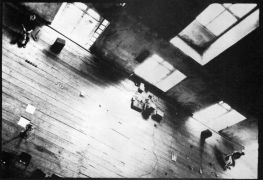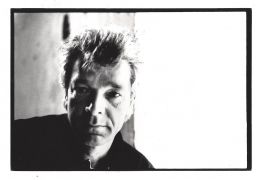"The intention for Victor Wentink and Horst Rickel to work at Plasy was to work quietly on new ideas for future music performances. The ideal location of Plasy and the many acoustic spaces would create good possibilities for exploring materials and testing ideas. Horst Rickel wanted to test his new Korg M1 in combination with pure acoustic sources, and Wentink and Rickel were going to demonstrate new music computer software and writing on a new text on art and technology to be published in 1993. Four concerts were presented in total. Three for audiences in the monastery Plasy and one in Prague in the Club Delta. Two were duo-concerts and two (including the one in Prague) were solo-concerts by Wentink.
In Plasy, there was material at hand that could be used as a sound-source in combination with pure computer-controlled electronic sounds. Especially the otherwise hard to get sink kitchen-ware that was to be found in the village stores was perfect for acoustic and electrically amplified sound production. The first public opening performance of the Hermit Project at the monastery was given by Victor Wentink and Horst Rickel with this material in the Refectory hall of the monastery at the 12th of June.
Horst Rickel did some experiments with his foot-driven organ pipe combined with singing at the st. Bernard chapel for the special acoustics in that space. He also made a new piece for piano that was performed on a grand piano in the corridor of the main convent building, while the audience was walking around listening from different positions to the piano 'soundwaves.'
Victor Wentink made contact with a group of four dancers who were also working in the Monastery to try out a dance performance on one of his electronic music pieces. The first attempt was presented in the Metternich Hall of the prelature at the last performance day. A further cooperation will take place in the Netherlands."
Victor Wentink and Horst Rickels, Plasy 1992
Horst Rickels (born 1947) studied piano construction at Grotrian-Steinway in Braunschweig and worked in that function at Bechstein in Berlin. After this, he studied music in Kassel where he composed ballet and theater music for the Staatstheater and was a member of the underground-band ‘Pigblood.’ In 1972, he started studying electronic composition at the Royal Conservatory in Den Haag. From 1973 on, he worked as a composer for the theater group Proloog in Eindhoven. In 1983, he earned his degree in music theory at the Brabants Conservatorium with a thesis on the dialectics of Brecht’s texts and Eisler’s music. During the next years he formulated new principles for multimedia theater, resulting in Van Gogh’s Laatste Oor and The Simulated Wood, among others. Supported by a grant from the Fonds voor Scheppende Toonkunst, he focused his research on the development of sound objects, sound sculptures and sound installations.
The central question of his research is how the principle of instability of tuning-systems, pictorial structures and performance practices can be made the central theme of art works. Another important aspect of his research is the study of spatial qualities of sound in relation to the natural and artificial environment. As a sound artist, he has shown his works in many countries and at international festivals. Often he has participated in projects that aimed at transforming outstanding places into a soundscape, such as Fort Klank (1994) in which he, Dick Raaijmakers, and Walter Maioli transformed an old fortification into a monumental musical instrument.
From 1985 until 2006, Rickels worked as a lecturer at The Design Academy in Eindhoven where he initiated sound-, theatrical- and interdisciplinary projects. In 1989, Rickels was invited to teach at the Interfaculty ArtScience of the Royal Conservatoire and the Royal Academy in The Hague. Since 2002, he has been coordinating ArtScience Master programs and he has been the acting head of the Interfaculty in 2007 and 2008. He has composed the soundtracks for his daughter Jiska Rickels' diverse films, among them Himmelfilm, Untertage, or 4Elements which won different international prizes. In 2006/07 Horst Rickels was Artist in Residence at the NFTA (Dutch Film and Television Academy) doing research on the dialectics of music/sound and moving pictures.

